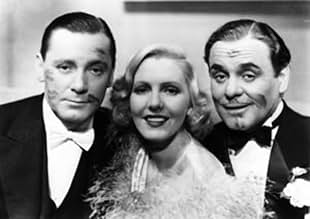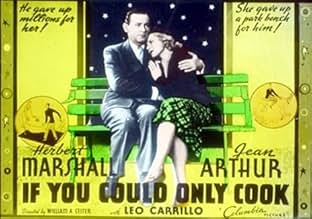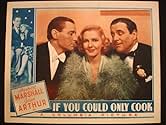IMDb रेटिंग
7.0/10
1.5 हज़ार
आपकी रेटिंग
अपनी भाषा में प्लॉट जोड़ेंAn executive lets an attractive cook talk him into taking a job as butler.An executive lets an attractive cook talk him into taking a job as butler.An executive lets an attractive cook talk him into taking a job as butler.
- निर्देशक
- लेखक
- स्टार
Frieda Inescort
- Evelyn Fletcher
- (as Frieda Inescourt)
Mariska Aldrich
- Swedish Cook
- (बिना क्रेडिट के)
William Anderson
- Newsboy
- (बिना क्रेडिट के)
John Ardell
- Member of Board of Directors
- (बिना क्रेडिट के)
William Arnold
- Second Inspector
- (बिना क्रेडिट के)
William Begg
- Wedding Guest
- (बिना क्रेडिट के)
Wyrley Birch
- Minister
- (बिना क्रेडिट के)
Joan Blair
- Kate
- (बिना क्रेडिट के)
Ralph Brooks
- Wedding Guest
- (बिना क्रेडिट के)
फ़ीचर्ड समीक्षाएं
The Austin Film Society showed this entertaining old film last week on election night. The receptive audience found laughs in many lines that still seem current, especially about unemployment, the want ads and being broke.
Jean Arthur looked lovely in this movie, and Herbert Marshall was perfect. What a wonderful voice that man had! My husband thinks that his walk may have inspired C3PO's formal motions, although the robot had a metal leg, not a wooden one like Mr. Marshall's.
Lionel Stander was already in full bellow, many decades before 'Hart to Hart', and Leo Carillo was a treat as the gangster employer. It was a surprise to hear them use the term 'wise guy' for a prospective member - I didn't realize it was already being used back then.
Jean Arthur looked lovely in this movie, and Herbert Marshall was perfect. What a wonderful voice that man had! My husband thinks that his walk may have inspired C3PO's formal motions, although the robot had a metal leg, not a wooden one like Mr. Marshall's.
Lionel Stander was already in full bellow, many decades before 'Hart to Hart', and Leo Carillo was a treat as the gangster employer. It was a surprise to hear them use the term 'wise guy' for a prospective member - I didn't realize it was already being used back then.
Entertaining, almost screwball-like, comedy about successful car designer, James Buchanan (Herbert Marshall), soon to be married in what seems like a "marriage of convenience" to a society woman he doesn't love. Well, he meets a pretty out-of-work blonde named Joan (Jean Arthur) on a park bench where she is busy reading the want ads. Finding an ad desiring a married couple for "cook and butler", they decide to pretend they are married and apply for the job (James agreeing to go along with the idea 'cause he "likes" her). Well, they get the job, the employers are a bunch of gangsters, and they end up living in the servants quarters above the garage with just one double bed!
This is a very enjoyable film, much better than I was expecting. The plot is lots of fun, and features a couple of my favorite actors, Jean Arthur and Herbert Marshall, who are both great in this - they even seemed to have some chemistry together (even though the first kiss between them looked almost like a boy kissing his grandma). The actors who play the gangsters in this are quite funny, especially Lionel Stander as the main man's sidekick, a guy named Flash who seems like just another dumb mug, but is actually the one who immediately catches on, via snooping around, that James and Joan may not really be a married couple. A really good film that deserves to be more well known than it is.
This is a very enjoyable film, much better than I was expecting. The plot is lots of fun, and features a couple of my favorite actors, Jean Arthur and Herbert Marshall, who are both great in this - they even seemed to have some chemistry together (even though the first kiss between them looked almost like a boy kissing his grandma). The actors who play the gangsters in this are quite funny, especially Lionel Stander as the main man's sidekick, a guy named Flash who seems like just another dumb mug, but is actually the one who immediately catches on, via snooping around, that James and Joan may not really be a married couple. A really good film that deserves to be more well known than it is.
This dry, low-key romantic comedy is very satisfying. Arthur is excellent, and Marshall is well cast as an automobile executive who wants to get away from his stuffy board of directors and his pushy fiancé, and finds happiness posing as a butler (initially so that Arthur can get work as part of a butler-cook team). Lionel Stander (as he often does) steals the show as the acerbic sidekick of gangster Carillo, and he's given some great lines. Carillo is pleasing, too, as the gangster who wants to live like the gentry, and who's romantically interested in Arthur, but who's willing to hold back because he's a gourmet and is even more interested in retaining her as a cook. The best thing about the film is that it never gets tripped up in excessive plot complications, or telegraphs its humor. Giving Carillo a gustatorial as well as romantic interest allows him to take certain actions without burdening the romance of the principals. And, after giving us enough of a glimpse of the snotty fiancé to know what Marshall's in for, the film has the grace not to show her face again; no silly "scheming" or tiresome bared claws. In the final scene, when all are trying to convince Arthur through a locked door that she should marry, they move from straight arguments to playing roles in a "routine," but there's no winking and signaling to signify a change in technique, it just flows quickly and naturally. The film has enough confidence in the unfolding of the relationship between the principals that the intrusion of other characters and mechanical "plot complications" can be kept to a minimum Thus Carillo's proposal and interference at the denouement serves mainly to allow Arthur to voice her feelings about Marshall, and Carillo actually brings them together rather than holding them apart. Nice film.
"If You Could Only Cook" is a small film apparently credited to Frank Capra at one point but actually not by Capra, made in 1935, and it stars Herbert Marshall, Jean Arthur, Lionel Stander and Leo Carillo. Carillo was the Cisco Kid's sidekick Pancho on the TV series that boomers may remember; and Lionel Stander's unmistakable voice will be remembered from the Robert Wagner TV show "Hart to Hart." This is a film made during the Depression, and it concerns a wealthy auto executive named Jim Buchanan (Herbert Marshall) who is about to be married to the right kind of woman and is dreading it. While sitting on a park bench trying to escape his board of directors and his fiancé, he meets a down to earth young woman (Jean Arthur) who is desperately looking for a job and can't find anything. Plus, she's just lost her room. She finds a job that pays well, but it's for a couple. She talks Jim into applying for it with her -- he's the butler and she's the cook in the home of a gangster (Carillo). Thanks to her sauce, she is hired. Thus begins Buchanan's double life. You can guess the rest.
A very charming movie with a delightful performance by Arthur and a good one by Marshall. It's always hard to believe that Herbert Marshall was ever a leading man given the roles he had later on, but he was a type that went out of style -- very formal, well spoken, a little stuffy, modeled on the British. Films in the '30s were often based on plays, and the plays of that era dealt with class differences.
Capra initiated a lawsuit against Columbia for crediting him with this film in England, where he was very popular, but Harry Cohn purchased "You Can't Take It With You" for him in exchange for dropping the suit. So a little film, never seen by Capra, paid him a big dividend.
A very charming movie with a delightful performance by Arthur and a good one by Marshall. It's always hard to believe that Herbert Marshall was ever a leading man given the roles he had later on, but he was a type that went out of style -- very formal, well spoken, a little stuffy, modeled on the British. Films in the '30s were often based on plays, and the plays of that era dealt with class differences.
Capra initiated a lawsuit against Columbia for crediting him with this film in England, where he was very popular, but Harry Cohn purchased "You Can't Take It With You" for him in exchange for dropping the suit. So a little film, never seen by Capra, paid him a big dividend.
If You Could Only Cook had been made over at MGM, Jean Arthur would have had her pick of leading men like Robert Montgomery, William Powell, Robert Young, or Franchot Tone all of who might have been a bit more believable as the auto tycoon who gets tired of his stuffy board of directors and walks out on them. As it was Columbia Harry Cohn got her Herbert Marshall is far better cast in more mature parts like in The Little Foxes or the head of MI5 in The List of Adrian Messenger. He really hasn't the touch for light fare like If You Could Only Cook.
That's what happens to Marshall though, he walks out on his board of directors and a week before his wedding to Frieda Inescourt who's from a family with an old name, but no dough. On the park bench he runs into Jean Arthur who is one of the great mass of unemployed. They get to talking about food and Arthur sees in the want ads one for a married couple to be cook and butler on an estate. On a whim as these things are in screwball comedies, Marshall and her agree to pose as husband and wife.
What they don't know is that who's hiring them is gangster Leo Carrillo who's particular about his food. Not unusual because if you remember Goodfellas the wise guys in stir were very particular about their food and were rich enough to buy what they want in the joint. Carrillo's number two, Lionel Stander, thinks these two just don't sound right.
The rest of the film is the normal antics of mistaken identities and mistaken motives and finding out who really loves who after all. It's not a bad film, but not particularly a memorable one.
But If You Could Only Cook attained a status way beyond its own importance in film history by becoming the object of a fraud perpetrated on the foreign markets by Harry Cohn. Seems as though when the film reached Europe, Cohn advertised it in the foreign markets as being a Frank Capra Production. When Capra found out about it, he went ballistic and ultimately his connection with Columbia was severed.
The story is described in great detail in Capra's memoirs and the whole saga is a great example of the power those studios had back when they were at their height.
In fact that whole story might make a great movie.
That's what happens to Marshall though, he walks out on his board of directors and a week before his wedding to Frieda Inescourt who's from a family with an old name, but no dough. On the park bench he runs into Jean Arthur who is one of the great mass of unemployed. They get to talking about food and Arthur sees in the want ads one for a married couple to be cook and butler on an estate. On a whim as these things are in screwball comedies, Marshall and her agree to pose as husband and wife.
What they don't know is that who's hiring them is gangster Leo Carrillo who's particular about his food. Not unusual because if you remember Goodfellas the wise guys in stir were very particular about their food and were rich enough to buy what they want in the joint. Carrillo's number two, Lionel Stander, thinks these two just don't sound right.
The rest of the film is the normal antics of mistaken identities and mistaken motives and finding out who really loves who after all. It's not a bad film, but not particularly a memorable one.
But If You Could Only Cook attained a status way beyond its own importance in film history by becoming the object of a fraud perpetrated on the foreign markets by Harry Cohn. Seems as though when the film reached Europe, Cohn advertised it in the foreign markets as being a Frank Capra Production. When Capra found out about it, he went ballistic and ultimately his connection with Columbia was severed.
The story is described in great detail in Capra's memoirs and the whole saga is a great example of the power those studios had back when they were at their height.
In fact that whole story might make a great movie.
क्या आपको पता है
- ट्रिवियाIn order to cash in on Frank Capra's popularity in England, Columbia Pictures released this film in London as "A Frank Capra Production, produced by Frank Capra." Capra, who had never even seen the film, was furious. This led to a bitter year-long dispute between head of Columbia Harry Cohn and Capra, who sued the studio for libel. It almost cost Cohn his job and almost resulted in Capra leaving the studio. It was resolved when Cohn relented and promised to buy for Capra the rights to the play "You Can't Take It with You" for $200,000, and pay him some back salary if he would drop the suit. Capra did.
- गूफ़When Rossini pulls up to tell his gang the hit is off, a reflection of the boom microphone is visible on the trunk of his car, lower right of the frame.
- भाव
Mike Rossini: Well, how a nice girl like you happened to get hooked up with a mug like that?
Joan Hawthorne: He isn't a mug.
Mike Rossini: Well, how he happen to sell you that bill of goods? How you happen to fall for him?
Joan Hawthorne: The Depression.
- कनेक्शनFeatured in The Lady with the Torch (1999)
- साउंडट्रैकBridal Chorus (Here Comes the Bride)
(uncredited)
from "Lohengrin"
Written by Richard Wagner
[Played on piano by Walter Byron at the wedding rehearsal, reprised by the band at the wedding]
टॉप पसंद
रेटिंग देने के लिए साइन-इन करें और वैयक्तिकृत सुझावों के लिए वॉचलिस्ट करें
- How long is If You Could Only Cook?Alexa द्वारा संचालित
विवरण
- रिलीज़ की तारीख़
- कंट्री ऑफ़ ओरिजिन
- आधिकारिक साइट
- भाषाएं
- इस रूप में भी जाना जाता है
- Wenn sie nur kochen könnte
- उत्पादन कंपनी
- IMDbPro पर और कंपनी क्रेडिट देखें
- चलने की अवधि1 घंटा 12 मिनट
- रंग
- पक्ष अनुपात
- 1.37 : 1
इस पेज में योगदान दें
किसी बदलाव का सुझाव दें या अनुपलब्ध कॉन्टेंट जोड़ें




























